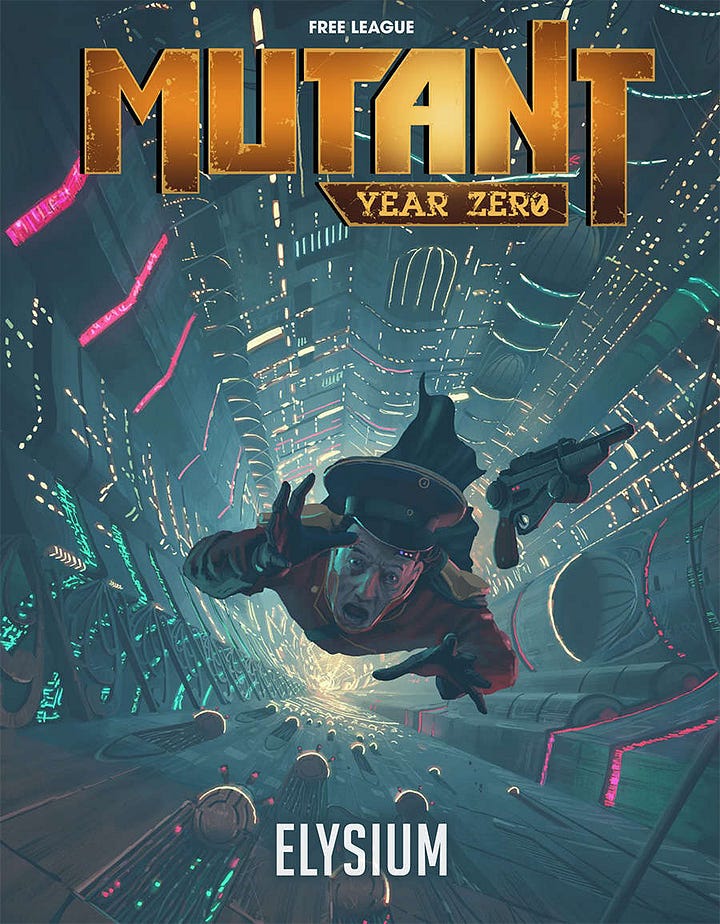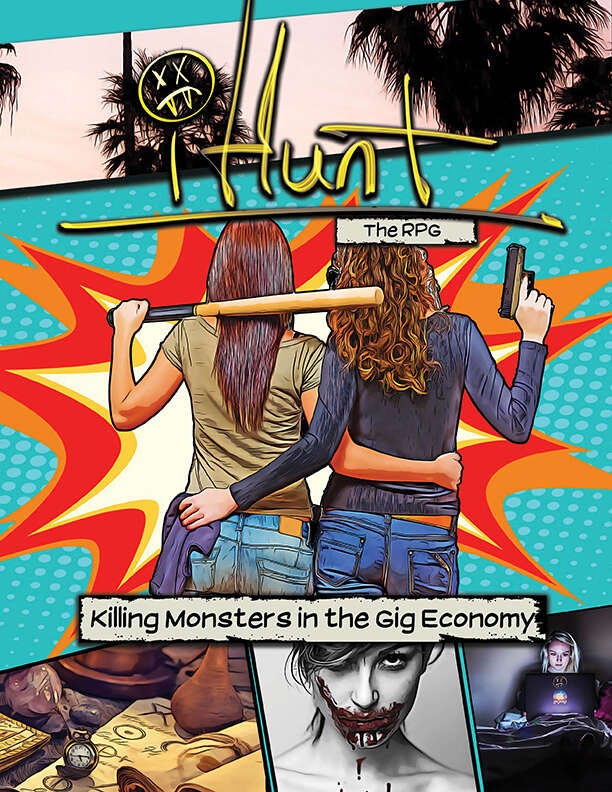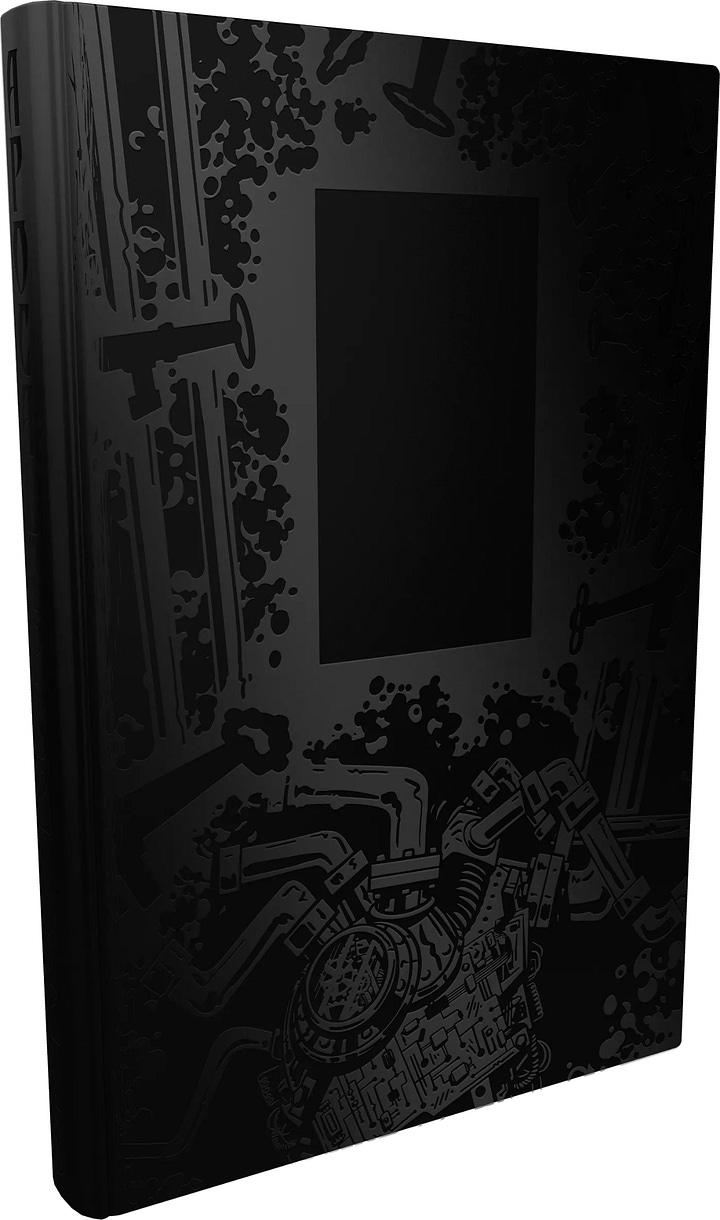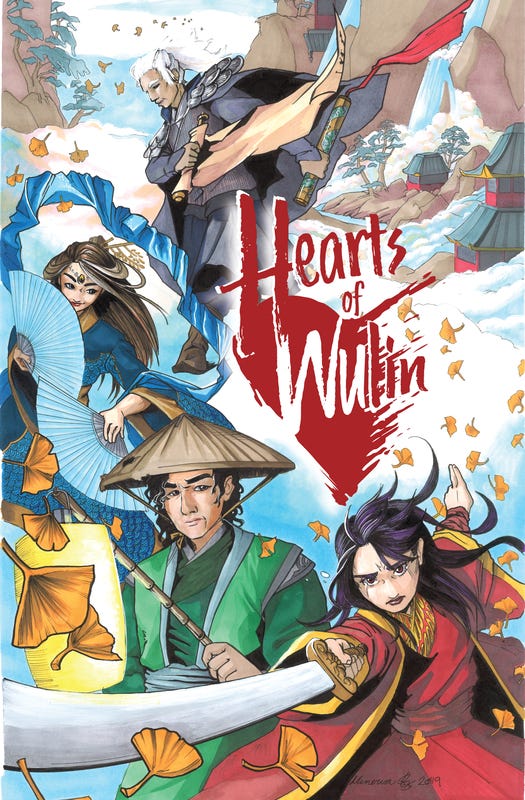



One of the greatest things about modern rpg gaming is that the issue of safety has become a great filter. Beyond the actual application of safety tools, it has become accepted and conventional to the point that a game has to make a deliberate choice not to discuss that in some way, particularly for any material moving towards edginess, horror, etc. If a game goes into problematic areas but doesn’t address those issues, someone has made a deliberate decision.
And that’s something which has changed over the last decade and it makes me super happy. Just a few years ago Free League publish Mutant: Elysium, a game where you effectively play fascist, human-supremacist, state tools who engage in ongoing PVP and player betrayal. Imagine Paranoia without the humor and more jackboots. And the only nod to the potential problems with this was a passage that said, yes players might get mad at one another and if that happened you should probably stop the game and talk about it.
Weak sauce.
Or another game, written in part by creators I respect, which covered a licensed property with a strong ethnic element, including a history of white co-opting, which had no talk about cultural issues in play, culture sensitivity, the challenges of playing characters from that culture. It boggled my mind at the time– but it was just far enough back I could squint my eyes and hold my nose. I like to think people would point out that absence today– or more likely that oversight wouldn’t have happened.
So when a ttrpg doesn’t have any discussion of boundaries, talking to the table, or handling safety– especially with tough themes– that’s a good filter– it moves it down in the likelihood of actually spending the effort to bring it to the table. I appreciate too when slightly older games start to address these issues in later supplements. More recent Star Trek Adventures publications like the Players & Gamemasters’ Guides and the Lowers Deck Sourcebook have called out theme and issues which could be a problem at tables (eugenics, suicide, death) and suggested way to talk about these with the table.
And here’s the thing I’m going to be brutally honest about. I thought safety tools were dumb when I first heard about them in the abstract. My immediate reaction was to go into grumpy GM mode, worrying about people talking away my autonomy as a GM. I thought up straw man arguments based on how imaginary players could use these to break or derail a game. I was an asshole about it. But then I started to see people actually railing about it and invariably they were people I considered asshole GMs. And I started to ask myself AITA?
More importantly I started to actually see and interact with these things in play. That really showed me how dumb I’d been about the whole thing. But two things sealed the deal for me. First I had a player I’d played with for close to two decades, a big, buff dude stop a game. He said: enough with the spiders. He finally told me that he was phobic, really badly phobic and sketched out an incident as a child. It had always stressed him out, had made him quit games, but he’d never said anything. We’d played together for years and years and I hadn’t known and he hadn’t said and it had made some of his time at the table really awful.
I see GMs say “my group has played together for years and never needed…” Yeah, f*ck you. I’m willing to bet there’s someone who had an evening ruined or quit your table because of that. And don’t get me started on the “we always had girls at the table and they never had a problem with it” line. Someone did and they felt like they had to get along and keep their mouth shut. But that’s an older generation of gamers– my generation of dinosaurs and the generation which followed us. I am genuinely grateful that the needle has moved and these kinds of discussions have become commonplace and accepted.
The second event which completely changed my take on this was at Gen Con running a late-night Saturday session for Game on Demand in 2017. A group of five sat down, four guys and a young woman. They were clearly a friend group who had been playing together for three days. I set up the game and then I went through the X-Card with the table. And I looked up at the young woman and saw a look which I can only describe as “thank f*cking god.” She didn’t know me, but she realized there was a chance that I wasn’t a total asshole.
So yeah, safety tools are one of the greatest modern meta-mechanics to facilitate play. I love reading how different games provide resources. On Open Hearth we ask that GMs use a layered set of tools for all sessions: Lines & Veils, the X-Card, and Open Door. Each has a different purpose and role. GMs have leeway to swap some of these out for other tools they’re more comfortable with but most people use these three because they’re accessible and work.
The best games spend some time discussing how these tools work in the context of the game and how to implement them. Safety tools aren’t a band-aid, the game facilitator and the table as a whole has to be aware of how to resolve situations using those tools. That can be a challenge and good games illustrate those techniques. There has to be follow through.
A couple of recent games have solid safety sections. #iHunt uses its own structure and lays things out pretty thoroughly. It also spends time talking about its philosophy regarding safety. Apocalypse Keys has a great three pages which tightly lay out the concepts of the game’s Green, Yellow, and Red approach. I’m biased but I think Hearts of Wulin also does a pretty good job– it combines a CATS explanation, safety tools, and some cultural notes.
But it wasn’t as good when I first sketched it out. It took time to develop some of those ideas– with influence from Agatha Cheng and James Mendez Hodes for the cultural discussion. Other concepts came from feedback. Hearts of Wulin offers romantic action melodrama. I knew I wanted to make clear that players should consider gender and sexuality fluid in play. But a playtester pointed out that the structure of mandatory romantic entanglements pushed out aromantic characters.
And again I’m going to cop to being dumb here. My first reaction was “well, it is a game about romance so that’s key to the genre.” But on reflection I realized how limiting and potentially alienating that could be. It didn’t take changing the rules to fix. I just added in language about how players who wanted Ace or aromantic characters could do that. They could swap out a romantic entanglement for a general one or they could read “romantic” as a strong bond of friendship, care, or devotion.
I’m ranging wildly in this because so much of table culture and play management circles around the broader concept of safety. It’s not an onerous thing and the care spent here pays back. It includes a lot of elements: active tools, collaboration, consent, check ins, establishing boundaries, and beyond. For example I stress that players should identify pronouns for themselves and their characters. In play they should also take care to get those right and make corrections when applicable.
I love this for a couple of reasons, but most importantly the one I talked about at the start of this. Using pronouns makes fascists, TERFS, and the like really mad. It’s a great filter for them. Every couple of months I’ll get a comment on one of my actual play videos. Most recently I got this one on a Dune session zero: “wow, this is the first time I've stopped viewing RPG content after just 5 seconds. however it is a must, after hearing the application of the pronouns after the presentation."
All I can say is good, die mad about it.



